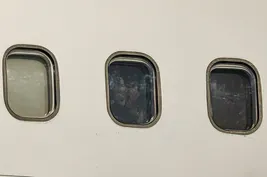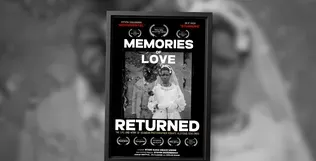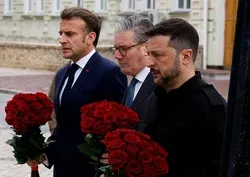
May 10, 2025 - PBS News Weekend full episode
5/10/2025 | 26m 45sVideo has Closed Captions
May 10, 2025 - PBS News Weekend full episode
May 10, 2025 - PBS News Weekend full episode
Problems with Closed Captions? Closed Captioning Feedback
Problems with Closed Captions? Closed Captioning Feedback
Major corporate funding for the PBS News Hour is provided by BDO, BNSF, Consumer Cellular, American Cruise Lines, and Raymond James. Funding for the PBS NewsHour Weekend is provided by...

May 10, 2025 - PBS News Weekend full episode
5/10/2025 | 26m 45sVideo has Closed Captions
May 10, 2025 - PBS News Weekend full episode
Problems with Closed Captions? Closed Captioning Feedback
How to Watch PBS News Hour
PBS News Hour is available to stream on pbs.org and the free PBS App, available on iPhone, Apple TV, Android TV, Android smartphones, Amazon Fire TV, Amazon Fire Tablet, Roku, Samsung Smart TV, and Vizio.
Providing Support for PBS.org
Learn Moreabout PBS online sponsorshipLAURA BARRON-LOPEZ: Tonight on PBS News Weekend, tensions remain high as India and Pakistan agree to a ceasefire following the most serious fighting between these nuclear powers in decades.
Then, as the Trump administration looks to boost deep sea mining, we discover how little of the ocean seafloor humans have ever seen and how a chance encounter turned into a 22-year journey documenting the life's work of a remarkable Ugandan photographer.
NTARE GUMA MBAHO MWINE, Filmmaker: The range of response, from sheer ablation to exuberance to shock that these pictures somehow resurfaced was all on display.
And it was incredible.
(BREAK) LAURA BARRON-LOPEZ: Good evening.
I'm Laura Barron-Lopez.
John Yang is away.
India and Pakistan agreed to a ceasefire today after the most serious military confrontation between the nuclear armed neighbors in decades.
The deal was expected to bring a swift end to the fighting after four days of drone volleys and missile strikes.
But just hours later, multiple explosions were heard India controlled Kashmir.
India's foreign secretary accused Pakistan of breaching the truce.
VIKRAM MISRI, Foreign Secretary, India: We take very serious notice of these violations.
We call upon Pakistan to take appropriate steps to address these violations and deal with the situation with seriousness and responsibility.
LAURA BARRON-LOPEZ: For its part, Pakistan's Foreign Ministry said it is ready to engage in, quote, constructive diplomacy and solve the dispute in Kashmir through peaceful means.
Lisa Curtis is director of the Indo-Pacific Security Program at the Center for a New American Security and she served on the National Security Council during President Trump's first term.
She joins us now.
Lisa, we all learned about this agreement when President Trump posted on Truth Social that the two countries had reached a, quote, full and immediate cease fire after U.S. mediated talks.
Is this actually a ceasefire?
And what do you make of the parameters of the deal?
LISA CRUTIS, Director, Indo-Pacific Security Program: Well, I think this is a very important ceasefire agreement that was announced.
I think the U.S. did have a role in it.
Secretary of State Rubio has been engaged with his Indian and Pakistani counterparts over the last several days.
It seems things came to a head on Friday when the situation was really escalating between the two countries and the U.S. got involved even more deeply.
Vice President Vance talked to Prime Minister Modi and finally today they were able to clinch a ceasefire deal.
Now, only a few hours after the deal was put into place, as you have reported, there were apparent violations of the ceasefire.
So this is, you know, not a good thing.
But I don't think that this means it's completely breaking down.
LAURA BARRON-LOPEZ: Pakistan's prime minister did not address India's accusation that they violated the ceasefire.
How volatile is this situation?
LISA CURTIS: Well, it is a volatile situation.
It has calmed down, of course, since yesterday, since we now have a ceasefire in place.
Both countries have acknowledged it.
So, you know, there is no reason, even if India believes that there may have been some violations.
This doesn't mean that India has to respond because, unfortunately, what we -- the cycle were in over the last four days was tit for tat, you know, responding with drones, missiles on each side.
And it was continuing to escalate.
But now that we have this agreement in place, there is a mood.
People are very happy.
There's a mood that things have calmed down.
And so I see the ceasefire violations as, you know, temporary.
Hopefully they're temporary.
And they do not mean that the situation is breaking down, but rather it's just an imperfect ceasefire at the moment.
And I think the U.S. will get involved.
It already has been involved.
It has brokered this ceasefire.
And so I'm sure that as we speak, the U.S. is talking with both sides, trying to figure out what is going on to make sure that they can get the cease fire back into place and get the situation calmed down again.
LAURA BARRON-LOPEZ: Lisa, what do you make of the fact that India's government said that this deal was brokered between India and Pakistan?
They didn't acknowledge any U.S. involvement and seem to reject some of the statements from the President and Secretary of State Rubio.
LISA CURTIS: Well, I don't think this is surprising.
India has always rejected any third party mediation in its dispute with Pakistan over Kashmir.
Pakistan has a completely opposite position where they constantly are trying to get international attention and mediation on the dispute.
So, you know, in these cases, it is important that the U.S. is involved in taking a role in pulling both countries back from the brink.
However, you know, the U.S. doesn't have a role in trying to, you know, resolve the fundamental territorial dispute over Kashmir.
That is not something that I think the U.S. can help out with.
That is something that both of the countries have to do on their own.
So India is very sensitive to any hints of outside mediation in their dispute with Pakistan.
And I think that's why they have really downplayed the U.S. role in this particular ceasefire agreement.
LAURA BARRON-LOPEZ: Lisa Curtis, thank you for your time.
LISA CURTIS: Thank you.
LAURA BARRON-LOPEZ: In tonight's other news, European allies are backing Ukraine in an effort to ramp up pressure on Russia to reach a ceasefire agreement.
Leaders from France, Germany, Poland and the United Kingdom gathered with President Volodymyr Zelenskyy in Kyiv today to mark the 80th anniversary of the end of World War II in Europe.
While there, the leaders demanded Russia agree to a full unconditional ceasefire for at least 30 days and threatened to step up sanctions.
Zelenskyy's office said after the European leaders spoke with each other, they had a constructive call with President Trump.
Face to face talks between the U.S. and China began today.
For the first time since President Trump placed new tariffs on Chinese goods.
Treasury Secretary Scott Bessent and the U.S. top trade negotiator Jamieson Greer met with a Chinese delegation in Switzerland.
While a major breakthrough wasn't expected for this round of talks, the two countries agreed to continue discussions tomorrow.
Last month, President Trump raised tariffs on goods coming into the country from China to a total 145 percent.
In retaliation, China hit U.S. goods being imported with a 125 percent tax.
A California judge temporarily blocked the Trump administration from carrying out mass firings across the federal workforce.
Late Friday night, Judge Susan Ilston issued an emergency order in response to a lawsuit filed by labor unions representing federal workers.
The order bars two dozen federal agencies from slashing personnel and closing down programs, an effort carried out in large part by Elon Musk's DOGE.
In her order, Judge Ilston said, quote, the president has the authority to seek changes to executive branch agencies, but he must do so in lawful ways and in the case of large scale reorganizations with the cooperation of the legislative branch.
The mayor of Newark, New Jersey, is out of jail but faces charges after he was arrested at an ICE detention center in his city.
Witnesses say Democratic Mayor Ras Baraka and three members of Congress attempted to make an unannounced visit to the facility Friday.
But when they were told to leave, an argument broke out and Baraka was arrested, according to witnesses.
Alina Haba, acting U.S. Attorney for the District of New Jersey and a Trump ally, said Baraka was taken into custody because he willingly chose to disregard the law.
Pope Leo XIV is setting the tone of his papacy.
The new leader of the Catholic Church held his first meeting with the cardinals since his election.
During his remarks, Leo singled out AI and said developments in the field pose a challenge to human dignity.
Following the meeting, the pontiff made a surprise visit to a sanctuary dedicated to the Virgin Mary in a small town south of Rome.
Later, he also visited the tomb of Pope Francis.
Still to come on PBS News Weekend, how little of the deep sea has ever been seen by human eyes.
And a film brings to life 50 years of work by a little known photographer in Uganda.
(BREAK) LAURA BARRON-LOPEZ: More than a month after the Atlantic broke the story that top U.S. officials were using the commercial messaging app Signal to share military attack plans, the Trump administration's handling of sensitive data is still under scrutiny.
Hackers targeted another app used by high ranking Trump officials known as TeleMessage, and also stole passenger information from one of the main airlines used by the White House to deport migrants.
Joseph Cox is the co-founder of 404 Media, which has investigated these hacks.
Joseph, thanks so much for joining us.
JOSEPH COX, Co-Founder, 404 Media: Thank you so much for having me.
LAURA BARRON-LOPEZ: So let's start with your investigation into the hack on the deportation flights.
What information was accessed and why is it valuable?
JOSEPH COX: So GlobalX is one of the primary airlines that ICE uses to deport people.
It did this during the previous administration, is doing it during this one as well.
When a hacker recently targeted GlobalX, it took flight information which is not that valuable because that's already publicly available.
But some really interesting details that it did manage to get were these passenger lists which actually tell us who was on each of these flights.
And of course, that is not publicly available information.
LAURA BARRON-LOPEZ: So that means information about the specific passengers.
JOSEPH COX: Yeah, information about the specific passengers on each flight is what the hacker obtained then sent to us and other journalists as well.
Well, and that allows us to determine, well, who exactly has been sent to each individual country.
And for example, there was a internal government list of people sent to the El Salvador mega prison that was published by CBS.
But if we go through the flights like we did at 404 Media, we actually get more names of people who've been sent to the country as well on those same dates.
LAURA BARRON-LOPEZ: You've also reported on the hacking of TeleMessage, an app used by Trump administration officials to back up copies of their chats.
What can you tell us about that?
JOSEPH COX: Yeah.
So over the weekend, a hacker targeted TeleMessage, which is a clone of Signal, this very popular secure messaging app that lots of people may be familiar with.
To be clear, it's not exactly the same as Signal.
Signal remains very much secure and people use that for secure communication all of the time.
This was making copies of all of the messages used by whichever Trump officials happened to be using it to comply with government regulations over keys keeping copies of their messages.
A hacker managed to break in and actually get the content of group chats, direct messages, and then send them to us as journalists as well.
I haven't seen for example, Mike Waltz's then National Security Advisors messages, but we did see messages belonging to other users of TeleMessage and just goes to show really how sensitive this data is.
And it could easily fall into the wrong hands.
LAURA BARRON-LOPEZ: Meanwhile, I also want to ask you about the Department of Government Efficiency known as DOGE, run by Elon Musk, because they're trying to create a centralized hub of personal data about millions of Americans.
And security experts have raised alarms about this and the collection of this information because they say it potentially bypasses data sharing protocols.
Would this make Americans personal information more susceptible to hacks?
JOSEPH COX: I think there's an inherent risk in bringing more data together that's usually siloed.
It could be secure in one location and another if you break down those firewalls between different agencies and then make it much more easily accessible to DOGE or agencies working with DOGE, that does potentially introduce more security risk and vulnerabilities.
So either DOGE itself or outside hackers could potentially get into as well.
LAURA BARRON-LOPEZ: And lastly, big picture, Joseph, when we're looking at all this, the hacks as well as what DOGE is doing, what does it say about the handling of sensitive data and Americans personal data by this administration?
JOSEPH COX: I think a lot of this shows the data is being handled in a pretty sloppy fashion, to be frank, with the DOGE stuff.
Breaking down these firewalls with Mike Waltz and other national security officials using Signal, then using this insecure version and then hackers targeting those systems and GlobalX, I mean it's very concerning that this really sensitive information and communications, I mean it already is falling into the hands of third parties as well.
LAURA BARRON-LOPEZ: Joseph Cox of 404 Media, thank you for your time.
JOSEPH COX: Thank you so much.
LAURA BARRON-LOPEZ: The deep sea covers about two thirds of the Earth's surface, but only a tiny fraction of it has ever been seen by human eyes.
That's the conclusion of a new study published this week, estimating humans have observed less than 1000th of a percent of the deep sea floor, an area roughly the size of Rhode Island.
The study's author, Katy Croff Bell, is working to change that.
She's a National Geographic explorer and the founder and president of the Ocean Discovery League.
Stephanie Sy has the story.
STAPHANIE SY: Katy Croff Bell, thank you so much for joining the program.
It's so fascinating to think that out of their vast ocean, we've seen basically a drop in the bucket.
I guess I would start by asking you why it matters that so much of the deep ocean has gone unexplored.
KATY CROFF BELL, Ocean Discovery League: Well, the deep sea is the planet's life support system.
It supports plankton in the upper ocean, which produce oxygen that we breathe.
Those plankton also feed fish, which in turn feeds over a billion people worldwide.
The deep sea absorbs heat and carbon dioxide, which moderates our atmosphere so we can live here on Earth.
And increasingly, we're seeing pharmaceuticals that are based on chemical compounds from marine animals.
But despite the numerous benefits from the ocean and the deep ocean, we're impacting the deep sea at an unprecedented.
And we really need to understand those habitats and the processes that are happening down there before we do irreparable harm.
STEPHANIE SY: So 0.001 percent of it has been mapped.
How did you determine how much of it, how little of it had been explored?
KATY CROFF BELL: Well, we actually used two different ways.
One was based on the dive records of three organizations here in the United States who have done thousands of dives over several decades.
And the other way was by taking actual dive track records and their distances along the sea floor.
And so we multiplied those by the amount that you see on the seabed, how fast those vehicles might have gone.
And even with those two independent methods of calculations, we came up with the same order of magnitude, this 0.001 percent of the deep sea, which is about 66 percent of our planet.
STEPHANIE SY: What do you think is down there that we do need to see?
KATY CROFF BELL: Well, that is the mystery, right?
There are so many things that we've found in the last 70 years of exploration.
New habitats, new understandings of life on Earth through the discovery of hydrothermal vents and other sorts of chemosynthetic systems, or life that depends on the chemistry of the water coming up out of the seabed.
So just imagine what's going to be in the 99.999 percent that we haven't explored yet?
STEPHANIE SY: There is a lot of concern out there right now that scientific research writ large is under threat.
Trump administration because of a lot of cuts.
I wonder how you believe your research may be impacted, if at all.
KATY CROFF BELL: We're not quite sure yet specifically.
But right now, of course, as you say there, we're seeing cuts and potential cuts across multiple federal agencies that deal with ocean science and management.
And there's no doubt this will affect scientific research across the country, including for deep sea exploration.
STEPHANIE SY: You talked about some of the potential in the deep sea that could beneficial to humans, such as pharmaceuticals.
Of course, there's also belief that deep sea mining may yield rare earth minerals in the deep sea.
Right.
And President Trump has signed an executive order hoping to explore that more.
What are your thoughts on that?
KATY CROFF BELL: I think that we need more research, but particularly on what the deep ocean ecosystems contain, what those habitats do in the ocean system and global systems, and what the potential impacts of extractive activities like deep sea mining might before we carry out those activities.
Because we know that the deep ocean, you know, there are organisms that live for hundreds and thousands of years that just can't rebound quickly.
So we need to understand what these ecosystems are and what the potential impacts will before we undertake these activities.
STEPHANIE SY: Katy, it's been expensive in the past to launch these deep sea expeditions and I know that your organization is working on making this type of exploration more accessible.
Can you talk about that?
KATY CROFF BELL: It's very expensive to do deep sea exploration and research.
You need a ship and vehicles that can cost millions of dollars and then tens of thousands to a hundred thousand of dollars a day just to operate them.
So that's why we're seeing most of the dives that have happened in the last 70 years concentrated in the waters of the U.S., Japan and New Zealand and undertaken by higher income countries.
So we're working on the development of a new 6,000 meter deep ocean research and imaging system, or DORIS, that's going to cost on the order of only a few thousand dollars.
So bringing down the cost and increasing the usability of these kinds of tools is really going to be a game changer for the deep sea community worldwide and we're really excited about that moving forward.
STEPHANIE SY: That is Katy Croff Bell with the Ocean Discovery League.
Katy, thank you so much for your insights.
KATY CROFF BELL: Thank you for having me, Stephanie.
LAURA BARRON-LOPEZ: Photography is known for its power to capture a singular moment in one frame.
But collectively and as time passes, photographs can take on much more meaning.
Filmmaker Ntare Guma Mbaho Mwine used a chance encounter with a photographer in a small Ugandan village to bring to life the everyday stories of its residents.
His film "Memories of Love Returned" premiered today at the New York African Film Festival.
And he spoke with Ali Rogin as part of our arts and culture series Canvas.
ALI ROGIN: Thank you so much for being here.
This journey began all the way back in 2002 when you met Mr. Kibaate Aloysius Ssalongo.
What drew you to him and to his work?
NTARE GUMA MBAHO MWINE: Kibaate Aloysius Ssalongo is a rural photographer from Mbirizi, Uganda, whose work had spanned over five decades, documenting thousands and thousands of people's lives.
And by chance, I stumbled upon his studio when my car broke down in his hometown of Mbirizi and I felt like I struck a gold mine.
ALI ROGIN: Tell me about what it was like seeing those images for the first time and realizing what a treasure trove you had stumbled upon.
NTARE GUMA MBAHO MWINE: It was like looking back in time, really.
And not just looking back in time in a broad sense, but looking back in time in terms of love and memories of love that have been captured on film lovers, couples on their wedding day, graduations, thousands upon thousands of people celebrating these precious moments in their life, all captured by him over a five decade period.
ALI ROGIN: Were you surprised by the depth and the variety of responses these images conjured up in people?
NTARE GUMA MBAHO MWINE: If you could imagine now we carry so many photos on our phones and imagine if the thousands of people that, you know, lost their phones for 50 years.
So family secrets, relationships, things that sort of been kept in the shadows were all of a sudden put on public display.
And the range of response from, you know, sheer ablation to exuberance to shock that these pictures somehow resurfaced was all on display and it was incredible.
ALI ROGIN: Mr. Kibaate's photos also capture a really fascinating moment in time for Uganda as a country.
There are images of women in miniskirts which you hear somebody explain were banned during the Idi Amin dictatorship of the 1970s.
There's also beautiful images of different same sex relationships, whether romantic or platonic.
And now, of course, Uganda has its own controversy with anti LGBTQ laws in effect there.
So what does it mean to have these particular periods in Ugandan history come to life again in this way?
NTARE GUMA MBAHO MWINE: What's remarkable is Kibaate's work covered the Everyman.
He didn't really discriminate.
He covered everyone.
He took these photographs.
And that, for me, speaks to his unique talent, because he wasn't sort of going by the rule book.
He was following his heart and following other people's heart who wanted to celebrate the love that they shared with each other.
ALI ROGIN: You noted how Mr. Kiabate took so many photos of the mundane, of the Everyman.
So often, especially in Western, in American culture, the images that we see from the African continent tend to be those of conflict, of suffering and pain.
Does that once again, deepen the meaning of these photos, given that they show people in various stages of everyday life?
Many enjoy many of the happiest moments of their life.
Weddings, celebrations, just the variety of the vitality of the Ugandan people on display.
NTARE GUMA MBAHO MWINE: One of the things that we all is a universal thing, is a love of photographs and being photographed and celebrating a moment by preserving it in a photograph.
And I think that's one of the things that's resonated with audiences who've seen the film.
And I think, as you said, its moments of love have been overlooked on the continent.
And it's time this film celebrates those moments of love that have been captured by Kibaate.
ALI ROGIN: You also weave your own story into the film in such interesting ways.
And I wonder what it was like for you, talking about and bringing up all of your personal memories.
How did it affect your relationship with your own personal story and experience?
NTARE GUMA MBAHO MWINE: No, it's.
I mean, this has been a labor of love for over two decades.
There have been people in my life who've passed, who we meet in the film, who've passed away during the filming process.
I myself had a personal health scare that is revealed in the film as well.
And these are all reminders that you know our time is limited and you know you have to find those moments that you can treasure and celebrate and share those and not squander them.
And that's where in the title lies "Memories of Love Returned."
ALI ROGIN: Ntare Guma Mbaho Mwine, thank you so much for your time.
The film is Memories of Love Returned.
NTARE GUMA MBAHO MWINE: Thank you, Ali.
LAURA BARRON-LOPEZ: And that's our program for tonight.
I'm Laura Barron-Lopez.
For all of my colleagues, thanks for joining us.
See you tomorrow.
(BREAK) END
Hackers leak to press details of Trump deportation flights
Video has Closed Captions
Clip: 5/10/2025 | 4m 31s | Hackers leak to press passenger details of Trump deportation flights (4m 31s)
How little of the deep seafloor humans have ever seen
Video has Closed Captions
Clip: 5/10/2025 | 5m 15s | Humans have seen a tiny fraction of the deep sea. Researchers are trying to change that (5m 15s)
New film brings Ugandan photographer’s work to life
Video has Closed Captions
Clip: 5/10/2025 | 5m 6s | ‘Memories of Love Returned’ brings Ugandan photographer’s work to life (5m 6s)
News Wrap: European leaders push Russia for full ceasefire
Video has Closed Captions
Clip: 5/10/2025 | 3m 16s | News Wrap: European leaders push Russia for full ceasefire in Ukraine (3m 16s)
Tensions remain high in India and Pakistan after ceasefire
Video has Closed Captions
Clip: 5/10/2025 | 5m 16s | Tensions remain high in India and Pakistan after apparent breaches to ceasefire (5m 16s)
Providing Support for PBS.org
Learn Moreabout PBS online sponsorshipSupport for PBS provided by:
Major corporate funding for the PBS News Hour is provided by BDO, BNSF, Consumer Cellular, American Cruise Lines, and Raymond James. Funding for the PBS NewsHour Weekend is provided by...















